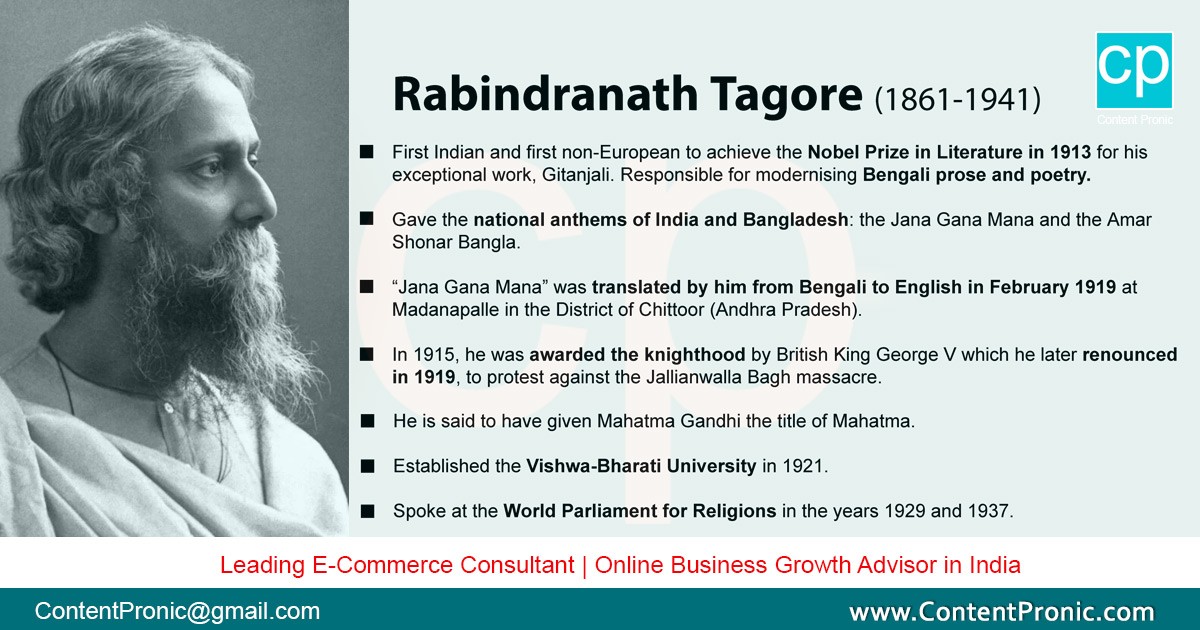
Rabindranath Tagore: Achievements, Contributions & Beliefs
Rabindranath Tagore: Life, Achievements, Contributions, and Teachings
Introduction:
Rabindranath Tagore, the Bard of Bengal, was a polymath, poet, philosopher, musician, playwright, and painter. Born on May 7, 1861, in Calcutta (now Kolkata), India, Tagore is celebrated as one of the greatest luminaries in the history of Indian literature and cultural renaissance. He became the first non-European Nobel laureate when he was awarded the Nobel Prize in Literature in 1913 for his collection of poems, "Gitanjali." Tagore's life, achievements, contributions, and teachings continue to inspire and resonate with people around the world.
Early Life and Education:
Rabindranath Tagore was born into a distinguished Bengali family. His father, Debendranath Tagore, was a leading figure in the Brahmo Samaj, a socio-religious reform movement. From an early age, Tagore showed remarkable talent in literature and music. He began writing poetry at the age of eight and composed his first verses by the time he was sixteen. Tagore's formal education was mostly conducted at home, where he was exposed to a wide range of subjects, including literature, history, philosophy, and music.
Literary Journey and Achievements:
Tagore's literary career blossomed with the publication of his first collection of poems, "Kabi Kahini" (The Tale of the Poet), in 1878. His subsequent works, such as "Sonar Tari" (The Golden Boat) and "Kalpana" (Imagination), solidified his reputation as a gifted poet. Tagore's writing showcased his deep love for nature, exploration of human emotions, and spiritual yearning.
In 1901, Tagore established a school in Santiniketan, a small town near Bolpur in West Bengal, which eventually became Visva-Bharati University. This educational institution promoted a holistic approach to education, blending Western and Indian philosophies. It became a vibrant center of art, literature, music, and dance. Tagore's emphasis on a creative and inclusive environment shaped the lives of numerous students who later went on to become renowned artists, musicians, and intellectuals.
Tagore's most acclaimed work, "Gitanjali" (Song Offerings), was published in 1910. It was a collection of his poems translated into English by himself. The lyrical verses in "Gitanjali" mesmerized readers worldwide and earned him international acclaim. This masterpiece not only brought recognition to Tagore but also had a significant impact on the Western literary scene, playing a crucial role in the global dissemination of Indian literature.
Nobel Prize and International Influence:
In 1913, Rabindranath Tagore became the first non-European to win the Nobel Prize in Literature. The Swedish Academy awarded him the prize for his profoundly sensitive, fresh, and beautiful verse collection, "Gitanjali." This accolade brought Tagore global recognition and made him a cultural ambassador for India.
Tagore's influence transcended borders, and he embarked on several international journeys, delivering lectures and sharing his thoughts on various subjects. He visited countries such as the United States, Japan, and China, where he interacted with notable personalities and promoted his message of universal harmony and cultural exchange. Tagore's philosophy and artistic expression resonated with people worldwide, fostering a deep appreciation for Indian literature and philosophy.
Contribution to Indian Nationalism:
Tagore's contribution to Indian nationalism cannot be overlooked. Although he was critical of certain aspects of Indian society and colonial rule, he did not embrace the narrow definition of nationalism that emerged during the struggle for independence. Instead, he advocated for a broader understanding.
Beliefs and Teachings:
Rabindranath Tagore's beliefs and teachings were deeply rooted in humanism, universalism, and the pursuit of truth and beauty. He believed in the power of education to transform individuals and society. Tagore's educational philosophy emphasized a holistic approach that integrated intellectual, artistic, and spiritual development. He believed that education should nurture creativity, free-thinking, and a sense of interconnectedness with nature.
Tagore was a strong advocate for cultural diversity and the preservation of local traditions. He emphasized the importance of respecting and embracing different cultures, languages, and religions. Tagore firmly believed that cultural exchange and dialogue could bridge the gaps between nations and foster global harmony.
Another significant aspect of Tagore's philosophy was his emphasis on the relationship between humanity and nature. He celebrated the beauty of the natural world and expressed a profound sense of interconnectedness between humans and their environment. Tagore's love for nature and his concern for ecological preservation was ahead of his time, making his works relevant even in today's era of environmental awareness.
Tagore's beliefs also extended to social and political issues. He was a vocal critic of imperialism, colonialism, and social injustices. Tagore condemned the dehumanizing effects of industrialization and the exploitation of labor. He advocated for the empowerment of women, equality, and social reforms. His works often depicted the struggles of the marginalized and oppressed, shining a light on the need for justice and compassion.
Conclusion:
Rabindranath Tagore's life, achievements, contributions, and teachings have left an indelible mark on the world. As a poet, philosopher, educator, and social reformer, he used his creative genius to promote love, peace, and harmony among individuals and nations. Tagore's poetry and writings continue to inspire people, transcending barriers of time, culture, and language.
His belief in the power of education, cultural diversity, and environmental stewardship holds immense relevance in today's world. Tagore's teachings encourage us to embrace our interconnectedness with nature, nurture our creative spirit, and strive for a more inclusive and compassionate society. His profound humanism and commitment to universal values remain as guiding lights, urging us to build a better world based on understanding, empathy, and respect.
Rabindranath Tagore's legacy endures, reminding us of the enduring power of literature, art, and philosophy to shape our lives and inspire positive change. He continues to be a beacon of enlightenment, reminding us to celebrate the beauty of life and cherish the diversity that enriches our human experience.
--
2moIt is very nice 👍 I like it
CEO
3moI request you to update his contribution to the Indian freedom moment. Did he ever go to jail for the freedom of India? Any financial contribution or physical involvement for Mother India? The below link will update your info on"Mahatma" word https://medium.com/@niranjanmehta/who-was-the-first-to-call-mahatma-mahatma-dbfdb5bda3ba